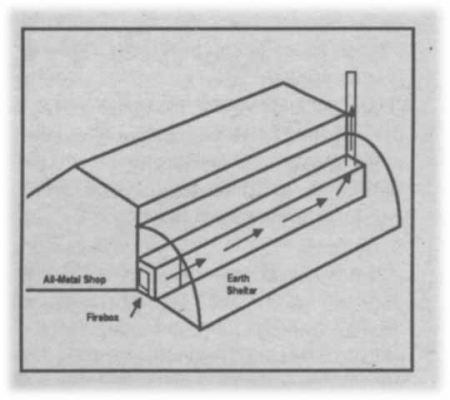
"Even in the coldest weather, it only takes two or three tires a day to keep my workshop nice and warm," says North Dakotan Lloyd Twite, of Minot, who gets "free" heat by burning whole tires one at a time in his home-built, earth sheltered furnace.
Twite's workshop is a 12 by 16 ft. building made of corrugated metal siding. To build the earth-sheltered stove, he first constructed a 16-ft. long burning chamber that sets on the ground and runs along the entire north side of the building. The chamber -- made of 1/4 in. sheet metal supported by vertical studs made of old metal pipe and spaced 2 ft. apart -- is 20 in. wide and 5 ft. high. The building's north wall serves as one side of the chamber.
At one end of the chamber, a "revamped" 200 gal. fuel oil tank serves as a 2 by 4 ft. firebox. It's equipped with a 10 by 30 in. vertical hinged door through which Twite can roll whole car tires directly into the firebox. At the opposite end of the 16 ft. long chamber is a 1 ft. dia. round metal chimney. The entire chamber is covered by a huge mound of earth which pushes up against the building's entire north wall.
The fuel supply -- a pile of old car tires -- is stored outside the building. Twite brings the tires inside the shop a few days ahead of time to dry them out before they're rolled, one at a time, into the firebox. He uses straw to start each tire on fire.
Heat from the firebox follows the entire length of the chamber and is trapped by the mound of earth, which forces it into the shed's metal wall to warm the shop's interior. "Each tire burns smooth and steady for two to three hours, and its heat stays for several hours afterward," says Twite. "In the coldest weather, I only have to burn two or three tires each day."
Twite shovels out the ashes each day and sifts them through an 8-ft. square flat screen. He scatters the fines in a field and throws the larger pieces into the garbage. He says he plans to install a grate and drop pit for collection of ashes and metal tire beads. "That way, I won't have to bother with ashes all winter long."
If his shop building was longer, say 40 ft., Twite says he would still run the chamber the full length of the building. "The farther the heat travels, the more efficiently it's used up. Even with my 16-ft. long chamber, it's amazing how much heat escapes through the chimney."
Twite collects free car tires from area scrap piles, tire dealers and gas stations. He notes that, for a larger building, the chamber and firebox could be made large enough to accommodate whole truck tires. So far, he has burned only car tires. "To burn wood or coal, I'd need a firebox with a larger draft opening. A pickle-size opening, plus a loose fitting firebox door, is all the firebox draft I need to burn car tires."
Twite says he's considering adding water pipes to conduct heat. "An earth sheltered, tire-burning furnace like this could easily be adapted to heat a house," he feels. "A water pump could deliver heated water through pipes into a radiator inside the house."
